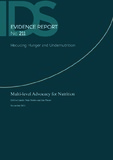| dc.contributor.author | te Lintelo, D.J.H | |
| dc.contributor.author | Nisbett, N | |
| dc.contributor.author | Pittore, K | |
| dc.coverage.spatial | Tanzania | en |
| dc.date.accessioned | 2016-11-22T09:48:04Z | |
| dc.date.available | 2016-11-22T09:48:04Z | |
| dc.date.issued | 2016-11 | |
| dc.identifier.citation | te Lintelo, D.J.H.; Nisbett, N. and Pittore, K. (2016) Multi-level Advocacy for Nutrition, IDS Evidence Report 211, Brighton: IDS | en |
| dc.identifier.uri | https://opendocs.ids.ac.uk/opendocs/handle/20.500.12413/12677 | |
| dc.description.abstract | Over the past decade, nutrition has received strong global attention as a development problem. Concerted efforts by international donors, philanthropical foundations, national and international non-government organisations and civil society have pushed nutrition further up global and national policy agendas. This has led to growing convergence on goals, strategies and interventions to tackle undernutrition, seeking to support country-owned, country-led strategies for addressing undernutrition. Policy advocacy has played a critical role in getting to this stage; it has raised awareness among key stakeholders of the underlying and immediate causes (direct and indirect) of malnutrition and its human, economic and other consequences. Advocacy is hence seen as essential for strengthening and supporting actions towards sustained political commitment, and effective multi-stakeholder and multi-level governance for nutrition. Domestic advocacy initiatives – including those related to international campaigns such as Scaling Up Nutrition (http://scalingupnutrition.org) and the 1,000 Days Partnership (www.thousanddays.org/) – have tended to focus on policymaking at international and national levels. This has also characterised many studies of nutrition and health advocacy. Pelletier et al. (2013) study national-level nutrition advocacy to present a useful set of ‘principles and practices of nutrition advocacy’. However, they do not set out to discuss advocacy or the potential catalytic role of civil society at the subnational level. Indeed, few studies have looked at nutrition advocacy beyond the international and national levels. This sharply contrasts with parallel nutrition debates, which underline that policy implementation dynamics mediate the outcomes of nutrition policy initiatives, and thus require greater analysis. This demands an analytical shift away from capital cities and the hubbub of central government administrations, donors, international and domestic pressure groups and national media to the realities, practices and political economies at subnational level. | en |
| dc.description.sponsorship | UK Department for International Development | en |
| dc.description.sponsorship | The material has been funded by UK aid from the UK Government, however the views expressed do not
necessarily reflect the UK Government’s official policies. | en |
| dc.language.iso | en | en |
| dc.publisher | IDS | en |
| dc.relation.ispartofseries | IDS Evidence Report;211 | |
| dc.rights.uri | http://creativecommons.org/licenses/by/4.0/ | en |
| dc.subject | Nutrition | en |
| dc.subject | Politics and Power | en |
| dc.title | Multi-level Advocacy for Nutrition | en |
| dc.type | IDS Evidence Report | en |
| dc.rights.holder | IDS | en |
| dc.identifier.ag | OT/11009/1/1/700 | |
| rioxxterms.funder | Default funder | en |
| rioxxterms.identifier.project | Default project | en |
| rioxxterms.version | VoR | en |
| rioxxterms.funder.project | c941507f-fd0b-4fc3-9822-4b2132f61a1d | en |


